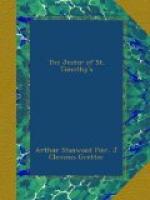“I wish I was breaking training there,” said Carroll to Irving; “she has the most wonderful food.”
In the discussion of the game there seemed to be little disposition to blame Westby.
“After all,” said Blake, “he was only a sub, and he never got so very much practice in handling punts. I don’t think fellows ought to be sore on him.”
“No, he’s just sore on himself,” said Carroll.
“It’s hard luck, anyhow; except for that one thing he played mighty well.”
The mail boy passed, leaving a letter for Irving. It was in his uncle’s handwriting; and his uncle never wrote to him; it was his aunt who kept him posted on all the news of home. Did this mean that she was ill—or that some disaster had befallen?
Irving determined that if it was bad news, he would reserve it until he should be alone; he put the letter in his pocket and waited anxiously for the meal to end.
When he was again in his room, he tore open the envelope and read this letter:—
DEAR IRVING,—I have not helped you and Lawrence much financially. I thought it would do you and him no harm to try out your own resources. But I always meant to give you a lift whenever it should seem wise, and whenever a lift could be most advantageously arranged.
Your father was never able to lay up any money; his work was of a kind that did not permit that. But he would always have shared with me whatever he had. I have had it in mind to do the same by his children. I have sold half the farm—the western half—your half and Lawrence’s. There is four thousand dollars in cash for each of you, and four thousand on a mortgage for each of you at six per cent. You had better draw out of school-teaching as soon as possible and study law—if that is still what you most want to do.
Your aunt is well and
sends her love. We are both looking forward
to seeing you and Lawrence
at Christmas.
Your affectionate uncle,
ROBERT UPTON.
A flood of warm emotion poured through Irving; his eyes filled. He had sometimes thought his uncle selfish and narrow—and all the time he had been working towards this!
Irving wrote his reply; he wrote also to Lawrence. Then he took his letters down to the Study building, to post them so that they might go out with the night mail. On his way he passed the Barclay house; it was all brightly lighted, the sound of laughter and of gay boy voices rang out through the open windows; the notes of a piano then subdued them, and there burst out a chorus in the sonorous measured sweep of “Wacht am Rhein.”
Irving stood for a few moments and listened; his exultant heart was responsive to that shouted song. Fellows who could sing like that, he thought, must have trodden disappointment under heel.
An hour later, when Irving sat in his room, the boys who had been entertained at the Barclays’ came tramping up the stairs. They were still singing, but they stopped their song before they entered the dormitory. Irving met them to say good-night—first Dennison and then Morrill and then Louis Collingwood.




